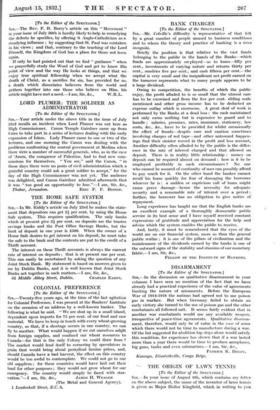BANK CHARGES [To the Editor of the SPECTATOR.] SIR,—Mr. Colville's
difficulty is representative of that felt by a great number of people unused to business conditions and to whom the theory and practice of banking is a terra incognita.
Briefly the position is that relative to the vast funds belonging to the public in the hands of the Banks—which funds are approximately err ployed—as to loans—fifty per cent., investments of varying nature and returns thirty per cent., sundries five per cent., and cash fifteen per cent.—the capital is very small and the insignificant net profit earned on the turnover represents what to many people appears to be a large dividend.
Owing to competition, the benefits of which the public enjoy, the profit alluded to is so small that the utmost care has to be exercised and from the five per cent. sliding scale mentioned and other gross income has to be deducted an expense outlay which is enormous. A great deal of work is performed by the Banks at a dead loss : the cash maintained not only earns nothing but is expensive to guard and to handle : salaries, premises, rates, insurance, stationery, law costs, &c., &c., have to be provided for whilst occasionally the effect of frauds—despite care and caution sometimes involving charges of red tape—and other untoward happen- ings find their sinister record in the profit and loss account, Another difficulty often alluded to by the public is the differ- ence in the rate of interest charged and that allowed on deposit. There is in reality little relationship : money on deposit can be required almost on demand : how is it to be employed profitably in such circumstances ? No one who cannot be assured of continuity of user can possibly afford to pay much for it. On the other hand the banker cannot recall his loans quickly for fear of damaging the borrower whoever he is : a sudden or capricious call of loans might cause grave damage—hence the necessity for adequate security and a reasonable rate of interest over a period : further, the borrower has no obligation to give notice of repayment.
Long experience has taught me that the English banks are an excellent example of a thoroughly democratic public service in its best sense and I have myself received constant expressions of gratitude and appreciation for the help and advice which the system enables the public to receive.
And, lastly, it must be remembered that the eyes of the world are on our financial system, more so than the general public realize ; it is one of the pillars of civilization and the maintenance of the dividends earned by the banks is one of the outward signs of the stability and stamina of our monetary fabric.—I am, Sir, &c.,
FELLOW OF THE INSTITUTE OF BANKERS.






























 Previous page
Previous page